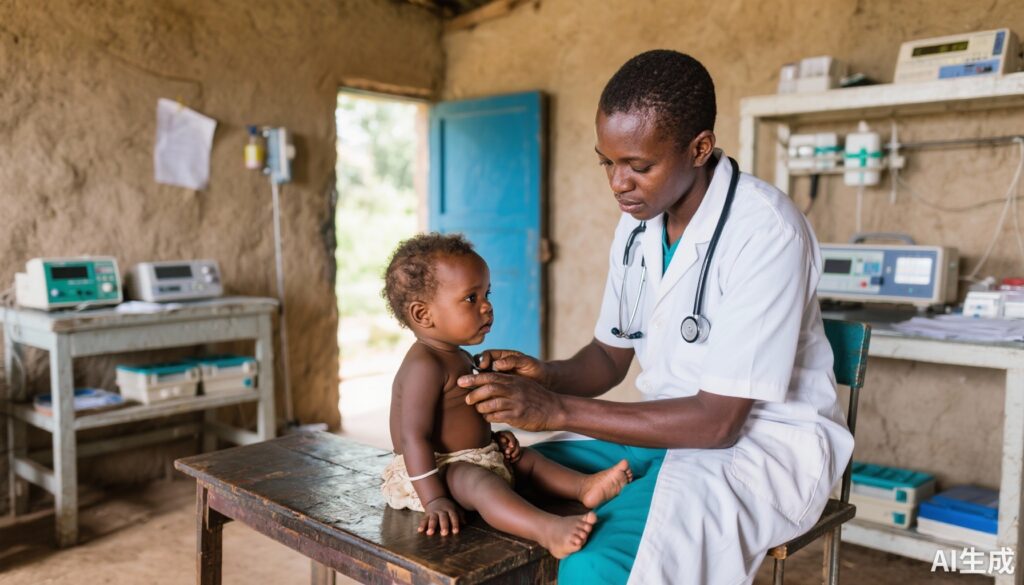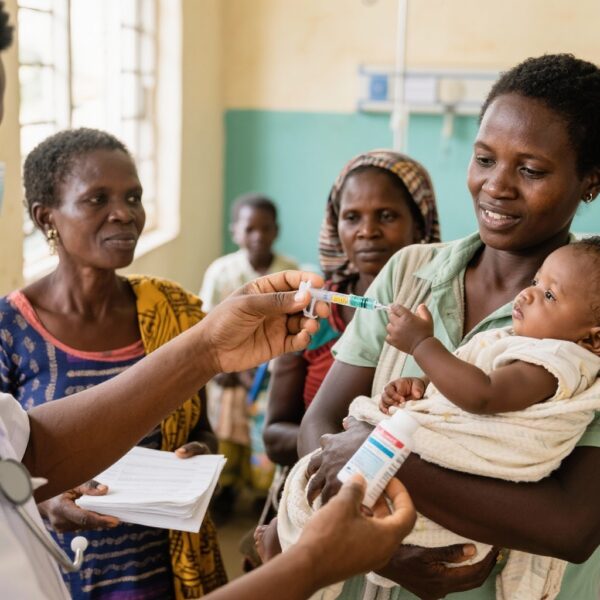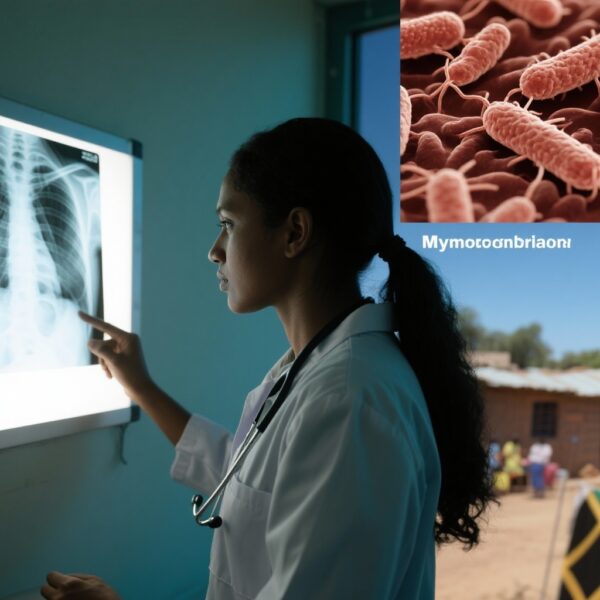Highlight
- An open-label, randomized trial compared outpatient versus inpatient treatment for young infants (<2 months) with one low-mortality-risk sign of possible serious bacterial infection (PSBI) across seven sites in South Asia and sub-Saharan Africa.
- Outpatient treatment consisting of 2 days of injectable gentamicin plus 7 days of oral amoxicillin was found non-inferior to inpatient treatment with 7 days of injectable ampicillin and gentamicin.
- Outpatient care demonstrated significantly lower mortality (0.3%) compared to inpatient care (0.7%) without an increase in other adverse outcomes.
- The study validates outpatient management as a safe, effective, and scalable alternative in low-resource settings, potentially overcoming barriers related to hospitalisation.
Study Background
Possible serious bacterial infection (PSBI) in young infants under 2 months of age is a critical cause of morbidity and mortality globally, especially in resource-limited settings such as sub-Saharan Africa and South Asia. Typical management of suspected PSBI has favored inpatient hospitalization, involving intensive and injectable antibiotic regimens to mitigate high mortality risk. However, hospitalization poses significant logistical and economic challenges, limiting access and adherence to care in low-resource environments. Prior observational data suggested that infants showing only a single low-mortality-risk clinical sign of PSBI might have favorable outcomes with simplified outpatient therapy. Clarifying if outpatient management yields similar safety and efficacy compared to inpatient care could transform treatment paradigms and reduce barriers to care.
Study Design
This was an open-label, multicentre, two-arm, randomized controlled trial conducted between June 2021 and April 2024 at seven hospitals across Bangladesh, Ethiopia, India, Nigeria, Pakistan, and Tanzania. Eligible participants were young infants (<60 days) presenting with one of three predefined low-mortality-risk PSBI signs: fast breathing in infants <7 days old, elevated body temperature (≥38°C), or severe chest indrawing.
Participants were randomized 1:1 to:
- Outpatient treatment arm: 2 days of injectable gentamicin and 7 days of oral amoxicillin administered on an outpatient basis.
- Inpatient treatment arm: 7 days of injectable ampicillin plus gentamicin with hospital supportive care according to standard protocols.
The primary endpoint was a composite “poor clinical outcome,” including death, critical illness, signs of other severe infections, new PSBI signs at scheduled follow-ups (days 2, 4, 8, and 15), or persistence of the presenting sign on day 8. The study was powered to test both superiority and non-inferiority of outpatient treatment relative to inpatient care using the Farrington-Manning score test. The trial is registered under ISRCTN44033252.
Key Findings
A total of 7001 infants were enrolled and randomized evenly between outpatient (n=3501) and inpatient (n=3500) groups, analyzed on an intention-to-treat (ITT) basis.
– Poor clinical outcomes occurred in 7.7% of outpatients and 7.8% of inpatients, yielding a risk difference of -0.0009 (95% CI -0.0134 to 0.0116; p=1.0000), demonstrating no superiority but supporting non-inferiority of outpatient care.
– Mortality rates were lower in the outpatient group (0.3%) compared to inpatient care (0.7%), a statistically significant difference (risk difference -0.0040, 95% CI -0.0072 to -0.0008).
– Per-protocol analysis reaffirmed outpatient treatment’s non-inferiority with similar poor outcome rates (7.7% vs 7.9%, p=0.0012).
– No treatment-related serious adverse events aside from deaths were reported in either group, emphasizing good safety profiles.
These results consistently indicate that outpatient antimicrobial therapy with gentamicin injection and oral amoxicillin for young infants with a single low-mortality-risk PSBI sign is as clinically effective and safe as traditional inpatient care.
Expert Commentary
This study challenges long-standing clinical practices mandating hospitalization of young infants with possible serious bacterial infections regardless of illness severity. The large-scale, multi-country randomized trial design provides high-quality evidence supporting outpatient management of a well-defined low-risk subset of young infants, potentially reducing hospital burden and enhancing care accessibility in low-resource settings.
The significantly lower mortality seen in the outpatient cohort may reflect earlier treatment initiation, reduced exposure to nosocomial infections, or other systemic advantages of community-based care. However, the open-label design and pragmatic nature mean some bias cannot be excluded, and close clinical follow-up remains essential to identify deterioration.
Future research could optimize antibiotic regimens and explore integration into routine health systems. Guidelines may consider revision to incorporate outpatient options for carefully selected infants, coupled with robust community surveillance and referral mechanisms.
Conclusion
This multinational randomized trial demonstrates that outpatient treatment with a 2-day gentamicin injection plus 7-day oral amoxicillin is non-inferior and potentially superior in terms of mortality compared to inpatient care for young infants with one low-mortality-risk sign of PSBI. This represents a breakthrough in managing neonatal infections in resource-constrained environments, combining efficacy, safety, and improved accessibility.
Policy makers, clinicians, and global health programs should consider adopting outpatient treatment protocols for eligible infants to reduce hospital load and improve timely access to effective care, ultimately contributing to reduced neonatal morbidity and mortality in high-burden regions.
Funding and Registration
The trial was funded by the Bill and Melinda Gates Foundation. Registered with ISRCTN Registry (ISRCTN44033252).
References
PSBI Study Group. Inpatient versus outpatient management of young infants with a single low-mortality-risk sign of possible serious bacterial infection in sub-Saharan Africa and south Asia: an open-label, multicentre, two-arm, randomised controlled trial. Lancet Glob Health. 2025 Nov;13(11):e1892-e1902. doi: 10.1016/S2214-109X(25)00243-8. PMID: 41109260; PMCID: PMC12535820.
World Health Organization. Guidelines on managing possible serious bacterial infection in young infants when referral is not feasible. 2015. Available from: https://www.who.int/maternal_child_adolescent/documents/bacterial-infection-treatment/en/
Lassi ZS, Rashid S, Mansoor T, et al. Antibiotic regimens for serious bacterial infections in young infants. Cochrane Database Syst Rev. 2020;5(5):CD009456. doi:10.1002/14651858.CD009456.pub3.


